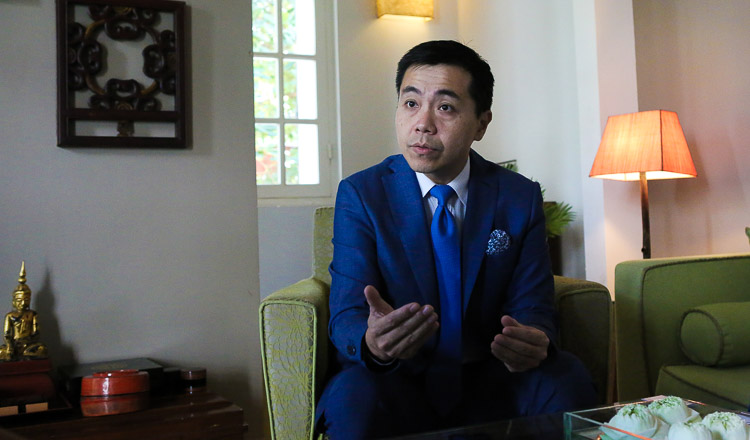Cambodia: Looking to the future with e-payment technology
Vincent Ling, the deputy general manager at UnionPay International Southeast Asia, talks to Khmer Times’ Chea Vannak about the latest development in e-payment technology in Cambodia.
KT: How has UnionPay evolved in Cambodia in recent years?
Vincent Ling: Since 2008 we have extended our acceptance network in the country to allow our clients to use their UnionPay cards when they visit the Kingdom. There are many people flying into the country from China, Korea, Hong Kong and even Thailand, and so they need to be able to use the cards because they are just much more convenient and safer.
This is what we are working on in terms of extending our acceptance network. We are now very competitive in this area and have come close to our competitors. The next natural step is to issue local cards.
Looking forward, we would like to see more progress in how we can actually contribute to the development of a cashless economy in Cambodia. We understand that only 13 percent of the population has a bank account.
I believe UnionPay has products that will eventually enable as much as 80 percent of Cambodians to join the electronic payment network. It could be in the form of pre-paid, debit, or even credit cards.
Once you have access to electronic payment, a whole new world of services and products opens us, such as being able to shop from your phone. That is how we would like to contribute to making Cambodia a cashless economy.
KT: How do you view the development of electronic payments in Cambodia in recent years?
Vincent Ling: Progress has been swift in the last few years. In terms of education, however, there is still a lot of work to be done to increase awareness of the advantages of electronic payments versus carrying cash in your wallet.
There is, obviously, an element of safety and convenience, particularly if you are making large purchases. Not to mention that once you go cashless, it is significantly easier to travel abroad.
In many circumstances, if you pay using a UnionPay card, you can enjoy significant discounts and other attractive deals.
KT: You mentioned that UnionPay will issue local cards in Cambodia. What is the difference between cards issued by local banks here and cards issued by banks outside Cambodia?
Vincent Ling: There is actually no difference. We have already partnered with some local banks and they are already issuing local UnionPay cards. For example, in July we launched a debit card service with Canadia Bank. We are currently working with 12 local banks in the country.
KT: How would you categorise the development of the fintech sector Cambodia?
Vincent Ling: Fintech is a very exciting field. It is a word I keep hearing everywhere I go. Fintech development is good for our sector. It helps develop awareness of the importance of electronic payments and the cashless economy.
One of our contributions to the sector is our QR code discount system. This system works at a global scale and we are developing together with other interesting payment schemes.
KT: What’s your view on the level of competition in the local fintech market?
Vincent Ling: Competition is very good. It helps to up standards in the industry. But I think we all need to come together to increase awareness about the benefits of using electronic payment methods.
KT: The authorities are currently drafting legislation to regulate the fintech sector. What’s your opinion on this?
Vincent Ling: In my opinion, Fintech is changing every day, constantly. There is constant innovation. I think the law still has to catch up with some of this innovation in the region. Currently our strategy is focused around building a strong foundation.
KT: What do you think about interbank transfers in Cambodia?
Vincent Ling: Cambodia has a large unbanked population, and interbank transfers are not accessible to many people. UnionPay can help by providing prepaid cards to the unbanked, as prepaid cards don’t need to be linked to a bank account.
They allow access to various types of financial services and products, giving the unbanked more financial choices and improving their lives.
Source: http://www.khmertimeskh.com/5084045/looking-future-e-payment-technology/


 Thailand
Thailand




